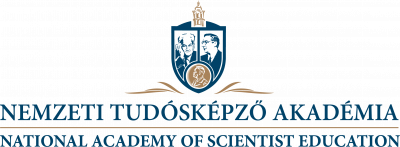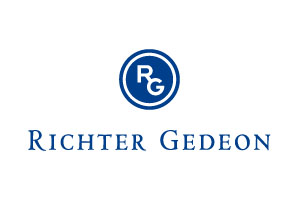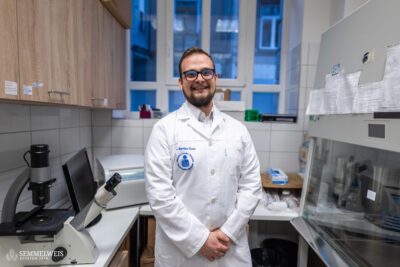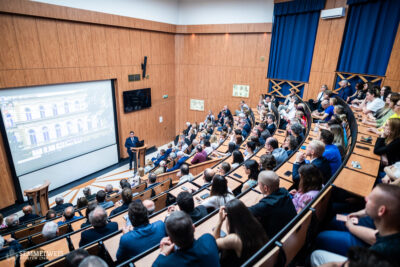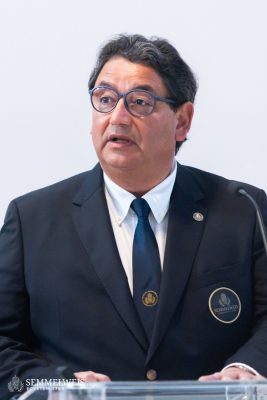 Semmelweis Symposium is traditionally the most prestigious international scientific event of Semmelweis University, where the latest scientific achievements and innovations of a given topic get the limelight, and the most renowned international and Hungarian representatives of the field deliver lectures – emphasized Dr. Béla Merkely, Rector of Semmelweis University. As he added, the motto of this year’s event is “Celebrating Excellence”, which is manifested in the program in several ways. The focus this year is on a topic representing one of the biggest challenges that face medicine. The prevalence of pancreatic diseases has increased by nearly 20 to 30 percent over the past decade, with nearly one in three patients dying from severe pancreatitis. Having recognized this, Semmelweis University established a dedicated institute for pancreatic diseases in 2021 with the aim of becoming an international center of excellence in this field.
Semmelweis Symposium is traditionally the most prestigious international scientific event of Semmelweis University, where the latest scientific achievements and innovations of a given topic get the limelight, and the most renowned international and Hungarian representatives of the field deliver lectures – emphasized Dr. Béla Merkely, Rector of Semmelweis University. As he added, the motto of this year’s event is “Celebrating Excellence”, which is manifested in the program in several ways. The focus this year is on a topic representing one of the biggest challenges that face medicine. The prevalence of pancreatic diseases has increased by nearly 20 to 30 percent over the past decade, with nearly one in three patients dying from severe pancreatitis. Having recognized this, Semmelweis University established a dedicated institute for pancreatic diseases in 2021 with the aim of becoming an international center of excellence in this field.
To enhance the prestige of the event, the 31st Symposium will witness the strengthening of the University’s relations with Academia Europaea, an association of leading European scientists. Furthermore, the event will feature a Nobel Prize-winning lecturer, Dr. Randy Schekman.
The symposium has traditionally been an excellent platform for international knowledge transfer and networking, which is of particular importance as the main driver of scientific development, the rector pointed out.
As Dr. Péter Hegyi, Director of the Institute of Pancreatic Disorders and the Center for Translational Medicine, the person in charge of the scientific program of the symposium, told our website, this year’s conference is divided into three sections.
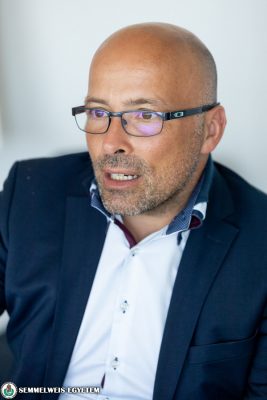 The symposium’s introductory lectures will be centered around translational medicine. As the most prestigious scientific society on the continent with 4,800 members, including hundreds of outstanding clinicians and 83 Nobel Prize winners, Academia Europaea considers translational medicine to be one of the most important approaches of the 21st century. “Semmelweis University also pays special attention to this approach, as a result of which the institution’s translational medicine program took a leading and visible role not only in the region, but also in the world, including Asia,” highlighted Dr. Péter Hegyi. As a consequence, on the first afternoon of the symposium, a Europe-Asia translational cooperation agreement will be signed between Academia Europaea, Semmelweis University, the National Biomedical Foundation in charge of the National Academy of Scientist Education, also known as the “Nobel Program” in Hungary, and the Chinese University of Hong Kong, which is ranked as the 53rd most outstanding university in the world at the Times Higher Education’s 2024 Ranking.
The symposium’s introductory lectures will be centered around translational medicine. As the most prestigious scientific society on the continent with 4,800 members, including hundreds of outstanding clinicians and 83 Nobel Prize winners, Academia Europaea considers translational medicine to be one of the most important approaches of the 21st century. “Semmelweis University also pays special attention to this approach, as a result of which the institution’s translational medicine program took a leading and visible role not only in the region, but also in the world, including Asia,” highlighted Dr. Péter Hegyi. As a consequence, on the first afternoon of the symposium, a Europe-Asia translational cooperation agreement will be signed between Academia Europaea, Semmelweis University, the National Biomedical Foundation in charge of the National Academy of Scientist Education, also known as the “Nobel Program” in Hungary, and the Chinese University of Hong Kong, which is ranked as the 53rd most outstanding university in the world at the Times Higher Education’s 2024 Ranking.
In continuation of celebrating excellence, this year’s symposium will focus on pancreatic diseases. Today, one of the most prestigious pancreatic research centers in Europe and, one could say, in the world is at Semmelweis University, with a high international visibility, as evidenced by the fact that the Institute of Pancreatic Disorders was featured on the cover of the September issue of Gastroenterology, the most prestigious journal in the field, pointed out Dr. Péter Hegyi. On this occasion, Hungarian and international experts in the field, the world’s most renowned pancreatic researchers will deliver nearly forty lectures on acute and chronic pancreatitis and pancreatic cancer, from risk factors through early detection to therapeutic advances.
The final session of the symposium will feature presentations by Dr. Ole Petersen, a pancreatic researcher at Cardiff University, and Dr. Miklós Sahin-Tóth, a Semmelweis alumnus, now professor at the University of California, Los Angeles (UCLA), who received an honorary doctorate degree of Semmelweis University in 2018. Dr. Randy Schekman, a cell biologist at the University of California, Berkeley, who was awarded the Nobel Prize for Physiology or Medicine in 2013 with his fellow researchers for his work on vesicular transport has also accepted the university’s invitation. On the occasion of the 10th anniversary of the award, Dr. Randy Schekman will give a lecture on tackling Parkinson’s Disease.
Participation is subject to registration, open until 8 December at this link. The symposium as a continuing education course is worth 48 credits for national doctors, dentists and pharmacists. PhD students will be awarded 1 credit for participation, 2 credits for accepted poster abstracts and 3 credits for Semmelweis Best Poster Award Winners.
Sponsors of the Semmelweis Symposium:
Pálma Dobozi, Judit Szabados-Dőtsch
Photo: Bálint Barta, Attila Kovács – Semmelweis University

